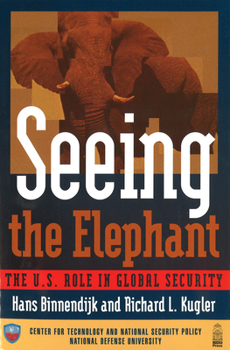Seeing the Elephant: The U.S. Role in Global Security
Select Format
Select Condition 
Book Overview
What is the current state of the global security system, and where is it headed? What challenges and opportunities do we face, and what dangers are emerging? How will various regions of the world be affected? How can the United States best act to help shape the future while protecting its security, interests, and values? How can the United States deal with the threats of terrorism and weapons of mass destruction? An intellectual history of U.S. national security thinking since the end of the fall of the Soviet Union, Seeing the Elephant is an attempt to see the evolving international security system and America's role in it through the eyes of more than fifty perceptive authors who have analyzed key aspects of the unfolding post-Cold War drama. Its premise is that, like the blind men in the Buddhist fable who each feels a different part of an elephant, these authors and their assessments, taken together, can give us a better view of where the world is headed.
Format:Paperback
Language:English
ISBN:1597971006
ISBN13:9781597971003
Release Date:November 2006
Publisher:Potomac Books
Length:336 Pages
Weight:0.95 lbs.
Dimensions:0.9" x 6.4" x 8.9"
Customer Reviews
2 ratings
An Excellent Time Saving Summary
Published by Thriftbooks.com User , 18 years ago
There's an old saying that predicting the future is easy, it's being right that's hard. The National Defense University produced this book that probably contains the right predictions. They did this by summarizing books on global security from a wide range of authors, in all some sixty books. It is intended that busy people can read this book and get an understanding of what these authors are saying without having to read the original work. They have broken down the predictions about the future into the optimistic view (neo-Kant) and pessimestic (neo-Hobbs). With each summarized book, the authors have attempted to give an unbiased summary of what the author is saying without injecting their own personal views. The biggest problem that I see with this book is that it predicts that the overall world view will remain about the same. There is no discussion about what happens to the world economy if oil goes up ten times or if global warming really raises the level of the oceans by twenty feet. As I said in the opening paragraph, the correct prediction is probably here, but picking which of the sixty predictions will be right is hard.
Such an analysis provides a foundation work central to any thorough understanding of U.S. foreign re
Published by Thriftbooks.com User , 18 years ago
Fifty analysts provide important essays on aspects of the post-Cold War political environment, analyzing the U.S. role in global security, tracing changes, and providing insights perfect for college-level students of political science. Even working politicians will find SEEING THE ELEPHANT as a major work providing an important intellectual history of U.S. national security thinking since the fall of the Soviet Union: such an analysis provides a foundation work central to any thorough understanding of U.S. foreign relations today.





